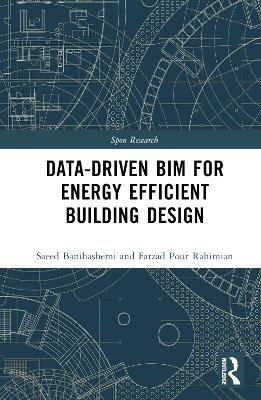
Data-driven BIM for Energy Efficient Building Design
Seiten
2022
Routledge (Verlag)
978-1-032-07348-4 (ISBN)
Routledge (Verlag)
978-1-032-07348-4 (ISBN)
This book presents a research-led approach to identifying the massive opportunities that BIM and AI offer to sustainable design and strategies.
This research book aims to conceptualise the scale and spectrum of Building Information Modelling (BIM) and Artificial Intelligence (AI) approaches in energy efficient building design and to develop its functional solutions with a focus on four crucial aspects of building envelop, building layout, occupant behaviour and heating, ventilation and air-conditioning (HVAC) systems. Drawn from theoretical development on the sustainability, informatics and optimisation paradigms in built environment, the energy efficient building design will be marked through the power of data and BIM-intelligent agents during the design phase. It will be further developed via smart derivatives to reach a harmony in the systematic integration of energy efficient building design solutions, a gap that is missed in the extant literature and that this book aims to fill. This approach will inform a vision for future and provide a framework to shape and respond to our built environment and how it transforms the way we design and build. By considering the balance of BIM, AI and energy efficient outcomes, the future development of buildings will be regenerated in a direction that is sustainable in the long run. This book is essential reading for those in the AEC industry as well as computer scientists.
This research book aims to conceptualise the scale and spectrum of Building Information Modelling (BIM) and Artificial Intelligence (AI) approaches in energy efficient building design and to develop its functional solutions with a focus on four crucial aspects of building envelop, building layout, occupant behaviour and heating, ventilation and air-conditioning (HVAC) systems. Drawn from theoretical development on the sustainability, informatics and optimisation paradigms in built environment, the energy efficient building design will be marked through the power of data and BIM-intelligent agents during the design phase. It will be further developed via smart derivatives to reach a harmony in the systematic integration of energy efficient building design solutions, a gap that is missed in the extant literature and that this book aims to fill. This approach will inform a vision for future and provide a framework to shape and respond to our built environment and how it transforms the way we design and build. By considering the balance of BIM, AI and energy efficient outcomes, the future development of buildings will be regenerated in a direction that is sustainable in the long run. This book is essential reading for those in the AEC industry as well as computer scientists.
1. Classics of the Data-driven BIM for Energy Efficient Design 2. Sustainability, Information and Optimisation: Antecedents of the Data and BIM-Enabled EED 3. BIM and Energy Efficient Design 4. Building Energy Parameters 5. AI Algorithms Development 6. BIM-inherited EED Framework Development and Verification 7. Conclusion
| Erscheinungsdatum | 30.11.2022 |
|---|---|
| Reihe/Serie | Spon Research |
| Zusatzinfo | 23 Tables, black and white; 51 Line drawings, black and white; 2 Halftones, black and white; 53 Illustrations, black and white |
| Verlagsort | London |
| Sprache | englisch |
| Maße | 156 x 234 mm |
| Gewicht | 503 g |
| Themenwelt | Mathematik / Informatik ► Informatik |
| Naturwissenschaften ► Biologie ► Ökologie / Naturschutz | |
| Technik ► Maschinenbau | |
| Technik ► Umwelttechnik / Biotechnologie | |
| ISBN-10 | 1-032-07348-9 / 1032073489 |
| ISBN-13 | 978-1-032-07348-4 / 9781032073484 |
| Zustand | Neuware |
| Haben Sie eine Frage zum Produkt? |
Mehr entdecken
aus dem Bereich
aus dem Bereich


